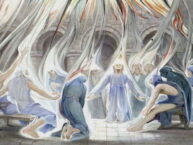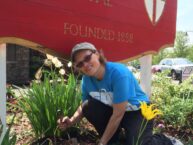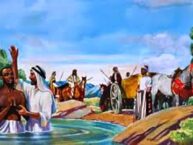 March 5, 2023: May God’s words be spoken, may God’s words be heard. Amen.
March 5, 2023: May God’s words be spoken, may God’s words be heard. Amen.
Well, we are now in the second week of Lent, and as the Lent Madness smackdowns have progressed, my bracket predictions are starting to look very sketchy. Harriet Monsell lost this past week to Johann Sebastian Bach. Now, as much as Harriet is the foundress of the monastic order that includes our own Community of St. John Baptist, where I am an Associate, and a powerful witness of Christ in the world, I suppose I should have seen that one coming.
Lent Madness is fun, but knowing more about the lives of the saints is something that can help us along the way. Since returning from the monastery retreat at the Abbey of Gethsemane I took in early February, and for some time prior to going, I have found myself drawn more deeply into the lives of the saints of the church. Of course, clergy are required to study them in seminary, and to pray the daily office, which will have a focus on their life within it, when a day has a saint assigned.
But lately, I am finding that the lives of people from Thomas Aquinas to Dorothy Day, Teresa of Avila to Bakhita, and martyrs from Uganda to El Salvador, are providing guidance and a place of prayerful turning when discerning God at work in my own life. Each of the saints are different from one another, their examples a wide variety of how one responds to the call of Christ, but in each there is a trust in God that is unmistakable.
That is what we are hearing in the Genesis narrative of Abram and Sarai, later Abraham and Sarah. God tells Abram to leave his homeland and family and head to an unknown place. But…why? Why would God ask that of Abram, or anyone for that matter? Well, God explains it, telling Abram, “So, that you will be a blessing.” Setting the blessing bit aside for a moment, why does God ask Abram to leave the familiar to venture out to the unknown?
You know, in the ordination process, seminarians are asked to leave their home parish as they continue along their discernment as postulants and candidates in the ordination process. And we will soon welcome a postulant here, Jackie McLeod, who is on the discernment journey of one who feels called to the diaconate – the Order of Deacons – a full and equal order in the church, even if it is not always seen that way by some. She is leaving her home parish, and we will certainly be blessed by her presence with us as she serves here.
We do this in the church so that those in the process can serve in a place that has no prior framing for who they are and what they can or should do. They are given a blank slate to better discern, and those with whom they serve have no box into which they have already – consciously or not – placed that person. Perhaps that is a part of why God did this with Abram.
It is also true that while there is a destination of a promised land and descendants in this Genesis story, it is really the journey itself that is the largest part of God’s calling – for Abram and for us.
But all of this call talk can sometimes have us thinking it is as obvious as getting a text or something – and that we just willingly always jump up and say – “Sure, put me in coach!” While God could communicate in whatever why God chooses, the response is likely to be more like this based on the long history of God and humanity: God sends a text “Hey – wanna be a blessing?” You text back “Sounds cool. Wad ya have in mind?” God replies “TPTB…which is of course – Moi – needs you to drop everything and go where I tell you, k?” “Ummm, u mean like right now? I kinda had plans.” God: “SMH”
Now, for some of our saints, the call of God was actually very clear – at least at first – and they did indeed accept it immediately. Mother Teresa heard the voice of Jesus lamenting the neglected poor while traveling on a train, and she began her call within a call to create a new order of monastics that would serve the poorest of the poor. Then there was Mary, the mother of Jesus – who got a visit from Gabriel that always reminds me of that opening scene of Dogma where Alan Rickman appears as a pillar of fire in the bedroom of Bethany.
I mean – you have to imagine that was a bit of a frightening thing to have this messenger of God show up when you are just a young teen (which is, what virgin actually meant – just that she was young). And as I heard another priest once add “I wonder how many other girls turned Gabriel down before Mary had the courage to say yes!”
Of course Abram didn’t get a fiery messenger, he got it right from the Source – the Source with a capital S mind you. Hard to miss that I would think.
Yet for most others, call is more subtle – like signs on the road that guide you. Or, like the wind Jesus talks about in his back and forth with Nicodemus. “The wind blows where it chooses, and you hear the sound of it, but you do not know where it comes from or where it goes.” We can get that imagery, right? Watch a tree on any windy day – we don’t see the wind, but we hear it, feel it on our cheeks, and see the leaves and branches move.
Call is like that for many – really most. You see a sign of some kind (or several) that seem to float by you, and you begin to piece a direction for your steps – even if you aren’t sure why it is you feel drawn toward whatever or wherever you end up heading.
To be clear, call is not about wearing a collar. You can feel called to be a parent, to go to a particular place at a particular time where you end up meeting your future wife or husband, or perhaps a sense of what you want to do next in your work or personal life – a career move, a new hobby, a returning to something that drew you when you were younger, and yes – even a pastoral call to ordained or monastic life.
But all this still leaves us with a lot of questions. What does it mean to follow a call, or for that matter, what does it mean to be a blessing? This is where our patriarchs and matriarchs of scripture, where the saints that have gone before us, can really help a great deal. Because we often can think that all those folk had their act together all the time.
Why, they just heard their call from God, and off they went right on to it – no doubts, no wayward detours, no refusals to even bother with it. But the fullness of the Abram story is that even with this incredible call of God, he wavered in certainty about it – so much so that he tried to pass his wife off as a sister (not just once mind you) to save his own hide. I mean – how exactly does that show trust that God will provide descendents through her? But wait, there’s more! Again, instead of trusting in the promise, he got a slave, Hagar, to be his concubine so he could ensure that those many descendants would actually happen. And, if that weren’t bad enough – and it was – he turned Hagar and her son out of the family camp towards a sure death. Nice, right? Spoiler alert – God saves her and she gets her own divine promise. This is our patriarch Abram.
Abram trusted God, but he doubted a lot too. And you know what, the same is true for the rest of the patriarchs, matriarchs, apostles, and saints through the centuries. As I have said many times, faith without doubt isn’t faith at all – it’s certainty. For some, these moments where we are unsure of God’s presence in our lives, much less that we truly are following God’s call for us, can feel as St. John of the Cross described it like “a dark night of the soul.”
It was something Mother Theresa knew well, for she endured this spiritual dryness in which she could not feel the presence of God for most of her life after those initial revelations of her call within a call to serve the poorest of God’s children. Yet only upon her death was anyone aware of it. “In my soul I feel just that terrible pain of loss—of God not wanting me—of God not being God—of God not really existing,” Mother Teresa wrote in one of her letters discovered after she died.
The thing about this dark night period into which so many of us fall is that for people of faith, there is always something else there with us. While faith always has doubt in its shadow…the reverse is also true. In those periods of spiritual dryness, when we are unable to sense God’s presence, we have the power of hope to see us through – a trust that is enduring.
This is what we are hearing in the Psalm we heard today. Psalm 121 is one often read at the bedside of the sick, at a funeral, or in other times of distress in our lives. And yet certainly in those moments we know that even while we place our trust in God, even knowing that God watches over us – it doesn’t mean we will not endure suffering – spiritual or otherwise. We look then to God, as the psalmist looked to the hills, and ask “where will our help come?”
And so our lives as a people of faith, of one with a call, is not about the absolute or the easy. It is about trust – trust that God does indeed watch over us, trust that help will come by way of the one who created all things, trust that even when we are in that dark night of the soul, the dawn will come. And for those who follow Jesus – we know this to be integral to our faith – this hope amidst despair, and life in the shadow of death – for even while we stand at the foot of the cross, the empty tomb awaits. Even while celebrating the resurrection, the shadow of the cross is ever present.
Even knowing that, we are still left with this question about the story of Abram – what is this blessing business? What is that about? What does it mean to be a blessing?
The thing is, God was sending him on this journey for the sake of all those they will impact – which in their case, was for the whole world. Abram couldn’t yet see it, but his story, his call, became a part of a much, much, larger story of God’s ongoing relationship with all of humanity through the ages.
What about us?
The same is true.
Think of it this way. We know that when we are living a life that is authentic – where we are passionate about what we are doing, where we have a sense of purpose – what we of faith would name a call – then even amidst the difficult days of our lives, there is something palatable about us – something others sense deep within us. And whether we are intentional about it or not, it is a blessing of sorts to others as much as to ourselves. By our very lives, we make an impact. Because blessing is about more than stuff – more than financial or power gains…it is about being the person fully alive that God created us to be and sharing that with the world.
Yet for followers of Jesus, this goes much further. We not only have the call of our individual lives, baptized into him, to live as he commanded us, we are also a community of his disciples. So, this parish has a call too, one that others started when they founded it and built this church in which we sit. And now we carry it forward.
It was, and still is, to be a blessing – a place of spiritual nourishment in Christ for those who walk through our doors, and a blessing to the community in which we serve. Notice that nowhere in that call does it say we will always have large endowments, filled pews, perfect music (though I think these folks come very close), fabulous preaching (no comment there) and more volunteers than we could possibly imagine. Nope – none of that is the call of this or any other parish.
Our call is simple in what is asked, but not always in how to live it. We are called to love one another as Jesus loved us, and to share that transformational experience of unconditional love and grace far and wide. For the parish it means we have to know the community in which we live, because to really love someone, we need to see them, to go to them, to know them. It is a call to go out from these doors and be the people God calls us to be every single day.
This is not an easy thing to do – it wasn’t for Abram. It wasn’t for the saints either.
But thankfully, like Abram, we don’t journey alone. He had Sarai and Lot – we have the people and clergy of the Diocese of Newark, well for that matter, the entire Episcopal Church – who walk alongside us. And while that is absolutely freakingly awesome – we have far more than that too. For in this combined community of Bloomfield & Glen Ridge, we have walking with us followers of Jesus in other denominations. And with our Jewish & Muslim sisters and brothers, who share this story of Abram with us, we can speak in a united voice to the working of God in all of creation throughout history – to God’s all inclusive and unconditional love and grace. And as we journey together, they will all be a blessing to us, as I pray we will be to them.
So let us be the people God created us to be, that we might be blessed and be a blessing.
For we are called to go where God sends us, just like Abram.
We are called to trust like the psalmist that our help will come from God – the maker of heaven and earth.
We are called to whether dark nights like the saints, knowing that hope abides in the faithful, and the light will overcome.
We are called to be a blessing in a world in which so many are just looking for someone to love them unconditionally – looking, without really knowing it, for God.
Amen.
For the audio, click below, or subscribe to our iTunes Sermon Podcast by clicking here (also available on Audible):
The Rev. Diana L. Wilcox
Christ Church in Bloomfield & Glen Ridge
March 5, 2023
Lent 2
1st Reading – Genesis 12:1-4a
2nd Reading – Romans 4:1-5, 13-17
Gospel – John 3:1-17






